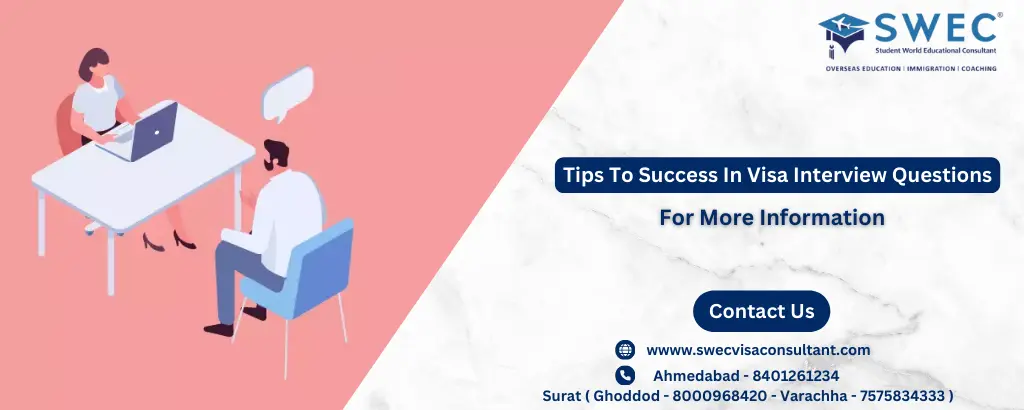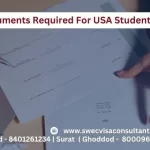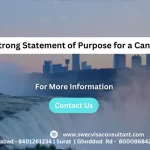Table of Contents
The world beckons with a kaleidoscope of educational opportunities! From prestigious universities steeped in history to cutting-edge institutions at the forefront of innovation, studying abroad empowers you with a globally recognized degree, broadens your cultural understanding, and equips you with valuable life skills. But before you embark on this enriching adventure, securing the appropriate student visa is crucial. This comprehensive guide empowers you to navigate the student visa process with confidence and transform your dream of studying abroad into a reality.
Understanding Student Visas
Student visas are country-specific permits that allow international students to enter a nation for the sole purpose of pursuing full-time studies at an accredited institution. Visa requirements and application processes vary depending on the destination country. However, some common elements apply:
- Valid Acceptance Letter: Secure an acceptance letter from a recognized university or educational institution in your chosen country. This letter confirms your enrollment in a full-time academic program.
- Financial Capability: Demonstrate sufficient financial resources to cover your tuition fees, living expenses, and other associated costs throughout your studies. This can be through personal funds, scholarships, sponsorships, or a combination thereof.
- Strong Ties to Home Country: Establish strong ties to your home nation, such as property ownership, family commitments, or a job offer upon graduation. This reassures the visa officer that you intend to return home after completing your studies.
- Academic Qualifications: Present evidence of your academic potential, such as transcripts, standardized test scores (if required by the program), and a well-written application essay outlining your educational goals and reasons for choosing the specific program and university.
How To Do Research For Your Student Visa
In addition to the core requirements, in-depth research about your target country is vital for a successful student visa application. Here’s what you should explore:
- Specific Visa Requirements: Each country has its own student visa application process and requirements. Research the official government website or embassy of your chosen country to understand the exact documents you need, eligibility criteria, and application deadlines.
- Cost of Living: Estimate your living expenses, including accommodation, food, transportation, healthcare, and miscellaneous costs. This helps you demonstrate financial capability to cover these expenses during your studies. Look for resources like government websites or student forums to get a realistic idea of living costs.
- Language Requirements: Some countries might require proficiency in the local language for admission or visa purposes. Research any language tests you need to take, like IELTS or TOEFL, and factor in preparation time.
- Cultural Nuances: Understanding the culture of your host country demonstrates genuine interest and helps you integrate smoothly. Research customs, traditions, and social norms to avoid any cultural faux pas.
Read More: How to Apply for an F-1 Student Visa for US
How To Apply For Your Student Visa Application?
The student visa interview is your platform to showcase your qualifications, financial preparedness, and genuine intent to pursue your studies abroad. Here’s how to make a stellar first impression:
- Gather Required Documents: Meticulously organize all necessary documents for the interview. This typically includes:
- Passport (valid for the duration of your studies and with some blank pages for visa stamping)
- Visa application form (completed accurately and signed)
- Acceptance letter from the university
- Proof of financial support (bank statements, scholarship letters, sponsor documents with income proof)
- Transcripts and academic certificates
- Standardized test scores (if applicable)
- Proof of health insurance (if required by the program or country)
- Additional documents specific to the country you’re applying to (check the embassy website)
- Research the University: Demonstrate in-depth knowledge about the university you’ll be attending. Research its history, location, faculty, academic programs, and unique offerings. This showcases your genuine interest and preparedness for the chosen program.
- Practice Makes Perfect: Rehearse potential interview questions and formulate clear, concise answers. Focus on highlighting your academic goals, career aspirations, and reasons for wanting to study in this specific country. Speak confidently and avoid rambling or providing irrelevant information. Consider mock interviews with friends, family, or education consultants to refine your responses.
- Dress for Success: First impressions matter! Dress professionally and appropriately for the specific culture of the country you’re applying to. Opt for conservative attire that reflects respect for the occasion. Avoid overly casual clothing, excessive jewelry, or strong fragrances.
Tips For Your Interview Day
- Arrive Early: Punctuality demonstrates professionalism. Aim to reach the interview location at least 15-30 minutes before your scheduled time to account for any unforeseen delays.
- Greet with Confidence: Maintain eye contact, smile politely, and greet the visa officer with a firm handshake.
- Speak Clearly and Concisely: Answer questions directly and to the point. Avoid rambling or providing unnecessary information. Speak clearly and audibly, enunciating your words for better understanding.
- Be Honest and Truthful: Honesty is paramount. Answer questions truthfully and accurately. Do not attempt to fabricate information or mislead the visa officer.
- Project Confidence: Maintain a positive and confident demeanor throughout the interview. This creates a favorable impression and reflects your genuine interest in studying abroad.
Read More: How to Write a Strong Statement of Purpose for a Canada Student Visa
Expected Interview Questions
The visa officer’s primary objective is to assess your financial capability to support your studies and your intent to return home after graduation. Some common themes in interview questions across countries include:
- Academic Background: Tell me about your academic background and why you chose this particular program.
- Financial Resources: How will you finance your education? Provide details about your financial support system. Be prepared to explain bank statements, scholarships, or sponsorship agreements.
- Future Plans: What are your plans after graduation? Do you intend to return to your home country? Explain how your studies abroad will benefit your future career in your home country.
- Country Knowledge: Why did you choose to study in this specific country? What are some of its cultural aspects or educational strengths that interest you? Demonstrate your understanding of the country’s culture and educational system.
- Program Specifics: Tell me about the specific program you’ll be enrolled in. What are some of the courses you’ll be taking? Show that you have researched the program curriculum and understand its relevance to your academic goals.
Common Pitfalls Leading To Denial
Understanding the most frequent reasons for student visa denials can significantly improve your chances of success:
- Country of Origin: Unfortunately, students from countries with historically high visa denial rates may face additional scrutiny during the application process.
- Weak Ties to Home Country: A lack of demonstrably strong ties to your home nation can raise red flags for consular officers. This could include limited family roots, a sparse job history, or insufficient financial resources to cover your educational expenses without external support.
- Interview Performance: First impressions matter significantly during a visa interview. Poor communication skills, vague or contradictory answers, or a nervous demeanor can raise doubts about your qualifications and intentions. Being prepared and confident is key.
- Financial Concerns: Unclear or inadequate financial documentation can cast doubt on your ability to support yourself during your studies. Providing detailed financial statements and proof of funding is crucial.
- Previous Visa Denials: A past visa refusal for any reason can complicate your student visa application. Understanding the reason for the prior denial and addressing it proactively is essential.
- Immigration Violations: Any previous breaches of immigration rules in the United States can lead to an automatic denial of your student visa application.
Strategies For A Successful Application
By taking proactive steps and planning ahead, you can significantly increase your chances of obtaining a student visa:
- Early Preparation: Begin gathering the necessary documents well in advance of your application deadline. Research the specific requirements for your visa category and country of origin to ensure you have everything needed.
- English Language Proficiency: Demonstrate clear and confident communication skills during your visa interview. Practice speaking English beforehand and focus on delivering concise and informative answers.
- Interview Preparation: Anticipate common interview questions and rehearse your responses to ensure they are clear, concise, and truthful. This will help you project confidence and preparedness.
- Professional Appearance: First impressions matter. Dress professionally for your interview, adhering to a business casual or formal attire depending on the embassy or consulate’s guidelines.
- Professional Guidance: Consider consulting an immigration attorney with experience in student visa applications. They can review your application materials, identify potential weaknesses, and conduct mock interviews to hone your interview skills.
How To Appeal For A Rejected Student Visa
Getting a visa rejection can feel like a setback, but don’t despair! Many countries allow applicants to appeal this decision if they have valid reasons. This in-depth guide explains the entire appeal process for Indian applicants, breaking it down into clear steps and providing valuable tips for crafting a winning appeal letter.
Understanding Your Appeal Options
- Does the Country Allow Appeals? The first step is crucial. Not every country offers an appeal process for visa rejections. Check the rejection letter itself or contact the embassy/consulate directly to confirm if appeals are allowed for your situation.
- Do You Have Strong Grounds for Appeal? Appealing simply because you’re disappointed won’t work. You need a solid case based on why you believe the rejection was incorrect. Here are some common reasons for successful appeals:
- Errors in Processing: If there were mistakes in your application or the visa officer made an error in judgment, you can appeal based on these inaccuracies.
- Changed Circumstances: Did your situation significantly change since applying? Perhaps you received a job promotion or secured confirmed travel bookings, showcasing stronger ties to your home country.
- Missing Documentation: If you couldn’t submit all necessary documents initially, explain why and provide them now to address the reason for rejection.
- Misrepresentation: If there was a misunderstanding or unintentional misrepresentation of information, clarify the details and provide any supporting documents to rectify the issue.
Time is of the Essence!
Countries have specific deadlines for submitting visa appeal applications. It’s crucial to find out the exact timeframe for your case and ensure your appeal reaches the embassy/consulate well before the deadline expires. Missing the deadline can automatically disqualify your appeal.
Read More: Essential Documents Needed for a USA Student Visa
Crafting A Compelling Appeal Letter
There’s no single format, but a strong appeal letter should follow these key elements:
- Your Details: Start with your full name, passport number, contact information (phone and email), and date of birth.
- Application Information: Mention the date of your original visa application and the intended purpose of your trip (tourism, business visit, etc.).
- Reason for Rejection: Clearly state the reason provided by the embassy/consulate in your rejection letter.
- Your Argument: This is the heart of your appeal. Explain in clear and concise language why you believe the rejection was wrong. Back your arguments with concrete evidence and supporting documents (if applicable).
- Supporting Documents: Include any relevant documents that strengthen your case. Examples might include:
- Proof of travel bookings (flights, hotels) in case your initial application lacked them.
- A letter from your employer confirming your job and planned leave of absence, demonstrating strong ties to India.
- Bank statements showcasing sufficient funds to support your trip, if that was the reason for rejection.
- Educational certificates or professional licenses relevant to your intended visit.
- A letter of invitation from a host in the destination country, especially if visiting for personal reasons.
- Conclusion: Politely reiterate your request for visa approval. Offer to provide any additional information the embassy/consulate might require to reach a favorable decision.
- Signature and Contact Information: Sign and date the letter, and include your full name, email address, and phone number for further communication.
Sample Appeal Letter Structure
Date:
Embassy/Consulate Address:
Dear Sir/Madam,
Paragraph 1: Introduction
- Briefly introduce yourself and state the purpose of your letter (appeal for visa rejection).
- Mention the date of your original visa application and the purpose of your planned trip.
Paragraph 2: Reason for Rejection and Your Argument
- State the reason for rejection mentioned in the official letter.
- Clearly explain why you believe the decision was incorrect. Focus on facts and avoid emotional pleas.
Paragraph 3: Supporting Documents (Optional)
- Briefly mention any documents you’ve attached to support your appeal and how they address the reason for rejection.
Conclusion
- Politely request the embassy/consulate to reconsider your visa application based on the information you’ve provided.
- Offer to provide any additional details they might require.
Sincerely,
(Your Signature)
(Your Full Name)
(Your Email and Phone Number)
Remember:
- Professional Tone: Maintain a respectful and professional tone throughout the letter.
- Clarity and Conciseness: Use clear and concise language, avoiding overly complex sentences or jargon.
- Proofreading: Proofread your letter carefully before submitting it to ensure there are no errors in grammar or spelling.
Read More: Understanding the UK Student Visa Credibility Interview
Strengthening Your Visa Appeal With Supporting Documents
An appeal letter for a rejected visa application is most powerful when accompanied by documents that address the reason for denial. Here’s a breakdown of common reasons for rejection and the kind of documents that can help your case:
Unclear Purpose of Visit
- Proof of booked travel: Include a fresh, detailed itinerary with confirmed flights (if not submitted earlier).
- Invitation Letter: A letter from a friend, institution, or organization explaining why they want you to visit and your planned activities.
- Cover Letter: Clearly explain your purpose of visit, planned activities, and why you want to travel to this specific country.
Concerns About Returning Home
- Student Enrollment: If not submitted earlier, provide a student enrollment document along with a letter from the school/university principal confirming your permitted absence during the visa period.
- Employment Letter: If you submitted an employment contract, get a letter from your employer stating your obligation to return after the trip.
- Proof of Property: Documents showing ownership of a business, house, or land in your home country.
- Family Ties: Marriage certificates, child birth certificates, or other documents proving family ties that motivate you to return home.
Insufficient Financial Proof
- Updated Bank Statements: If your previous bank statements didn’t seem sufficient, include updated versions reflecting additional funds.
- Letter of Support: A letter from someone willing to financially support you during your visit, along with their bank statement.
Inadequate Travel Insurance
- Updated Travel Insurance: If your existing coverage was insufficient, purchase new travel insurance or increase the coverage on your current plan. Submit the updated documents with your appeal.
Where to Submit Your Appeal Letter
Contact the embassy of the country you wish to visit for specific instructions. Generally, appeals are submitted directly to the embassy.
Visa Appeal Processing
After receiving your appeal, the embassy will forward it to the appropriate department for review. A senior officer will consider your letter and supporting documents before deciding whether to overturn the original decision.
Processing Time and Next Steps
The processing time for appeal decisions varies. The embassy will inform you of their decision and any further steps required.
Additional Tips For A Successful Student Visa Application
- Meet Application Deadlines: Ensure you submit your visa application well before the deadline set by the embassy or consulate. Early application demonstrates your seriousness and allows ample time for processing.
- Be Truthful and Transparent: Maintaining honesty throughout the application process is crucial. Any discrepancies between your application and interview can raise red flags and lead to visa rejection.
- Keep Records: Maintain copies of all submitted documents and communication with the embassy or consulate for future reference.
- Seek Professional Guidance (Optional): Consider consulting with immigration lawyers or education consultants familiar with the student visa process in your target country. They can provide personalized advice and ensure your application adheres to all requirements.
Read More: Understanding the UK Student Visa Biometric Residence Permit (BRP)
Conclusion
While a visa rejection can be discouraging, don’t give up on your travel dreams! By understanding the reasons for rejection and providing strong supporting documents in your appeal, you can significantly increase your chances of success. Remember, a well-organized appeal with clear explanations and relevant documentation demonstrates your commitment to following visa regulations and returning to your home country. So, carefully review the reasons for rejection, gather the necessary documents, and confidently present your appeal for a chance to turn your travel aspirations into reality.
Frequently Asked Questions
-
What are the most common reasons for student visa interview denial?
Common reasons include inconsistent answers, weak course or university knowledge, unclear study plan, weak home ties, doubtful finances, suspicious documents, and unclear post-study plans.
-
Can a student visa be refused only because of the interview?
Yes. If the visa officer is not satisfied with your credibility based on interview answers, it can lead to refusal even if your documents look fine.
-
What interview answers raise red flags for visa officers?
Red flags include memorized replies, contradictions with your application, not knowing course details, unrealistic budgets, unclear funding source, and unclear reasons for choosing the country, course, or institution.
-
How can I prepare for a student visa interview to avoid rejection?
Know your course, fees, modules, and intake dates. Be clear about your funding and sponsor. Practice explaining your study plan and why it fits your past education and career goals.
-
What should I carry to the student visa interview?
Carry your offer letter/CAS/CoE, tuition fee receipts, financial evidence, sponsor documents, academic transcripts, English test results (if applicable), and a simple study plan summary.
-
What should I do immediately after a student visa refusal?
Read the refusal letter carefully, note the exact refusal points, collect evidence to address them, and follow the timeline for appeal, administrative review, or reapplication (depending on the country).
-
Can I appeal a student visa refusal?
Sometimes yes, depending on the country and visa type. Options may include administrative review, formal appeal/tribunal, or submitting a new application with stronger evidence.
-
What is the difference between an appeal, administrative review, and reapplying?
An appeal challenges the decision through a legal process. Administrative review asks the authority to check for decision errors. Reapplying means submitting a fresh application with improved documents and explanations.
-
How long does a visa appeal or review take?
It depends on the country and process. Some reviews take weeks, while formal appeals can take months. Always check the refusal letter and official timelines.
-
What improves approval chances after a refusal?
Fix the refusal points directly: improve clarity of study plan, show stronger finances and source of funds, explain gaps properly, ensure consistency across documents, and prepare for a stronger interview.






